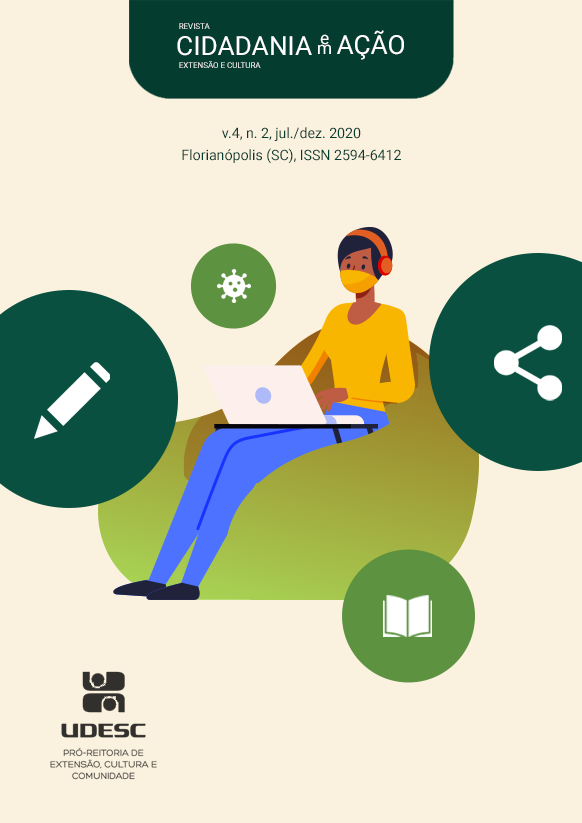PROMOTING ENVIRONMENTAL AWARENESS THROUGH CREATIVITY: extension project in a public school in the city of xxxxxxxxx / RS
EXTENSION PROJECT IN A PUBLIC SCHOOL IN THE CITY OF VENÂNCIO AIRES/RS
DOI:
https://doi.org/10.5965/25946412421Keywords:
Environmental Education. Extension. Creativity.Abstract
The environmental conditions of our planet are rapidly degrading, mainly because of the large amounts of waste generated around the world. Brazil is the 4th largest waste generator besides it has a low recycling rate (1.28%), what reveals that the approach to environmental education in schools becomes increasingly urgent. It is essential to work with this theme since childhood through approaches that are capable to attract young people and to generate engagement and participation. In this context, the use of active methodologies combined with approaches that promote creativity appears as an alternative with potential benefits. The present work is an experience report about an extension project carried out with students from the 3rd to 5th year of elementary school in a public school in the city of XXXXX / RS, which aimed to work on environmental education through activities that encourage creativity. There were held eight in which a debate was held on topics related to the 3 R's (Reduce, Reuse and Recycle), followed by a dynamic activity and a final conversation on the topic worked on. It was noticed a great engagement of students in the activities carried out and that they built positive reflections about the themes worked on. Along with environmental education, creativity was encouraged and developed, which is a positive fact, as it is known that creativity is important in adult life, both personally and professionally. Finally, it can be affirmed that the objectives have been achieved and that extension projects such as this one, which work in different ways under an interdisciplinary approach, can be successfully applied in several themes related to environmental education.Downloads
References
AGENCIABRASIL - EBC. Brasil é o 4º país que mais produz lixo no mundo. 2019. Disponível em: https://agenciabrasil.ebc.com.br/internacional/noticia/2019-03/brasil-e-o-4o-pais-que-mais-produz-lixo-no-mundo-diz-wwf. Acesso em: 26 ago. 2020.
BOPEGEDERA, A. M. R. P. Tie-Dye! An Engaging Activity To Introduce Polymers and Polymerization to Beginning Chemistry Students. Journal of Chemical Education, v. 94, n. 11. mar. 2017.
DIESEL, A.; BALDEZ, A. L. S.; MARTINS, S. N. Os princípios das metodologias ativas de ensino: uma abordagem teórica. Revista Thema, v. 14, n. 1, p. 268-288, 2017.
FILTRO DOS SONHOS. Sonhos, 2020. Disponível em: https: // www.sonhos.com.br/ filtro-dos-sonhos#.X9c_8thKhPY. Acesso em: 14 dez. 2020.
FLEITH, D. S. Criatividade: novos conceitos e idéias, aplicabilidade à educação. Revista Educação Especial, n. 17, p. 55-61, 2001.
FLICK, U. Introdução à metodologia de pesquisa: um guia para iniciantes. Porto Alegre: Penso, 2012.
JOLY, M. C. R. A. A criatividade verbal e sua importância nos ambientes educacionais. Psicologia Escolar e Educacional, v. 5, n. 2, p. 11-20, 2001.
LUYT, A. S.; MALIK, S. S. Can biodegradable plastics solve plastic solid waste accumulation? In: Plastics to Energy. William Andrew Publishing, 2019. p. 403-423.
MIRANDA, F. H. F.; MIRANDA, J. A.; RAVAGLIA, R. Abordagem Interdisciplinar em Educação Ambiental. Revista práxis, v. 2, n. 4, 2017.
MORÁN, J. Mudando a educação com metodologias ativas. Coleção mídias contemporâneas. Convergências midiáticas, educação e cidadania: aproximações jovens, v. 2, n. 1, p. 15-33, 2015.
ORGANIZAÇÃO DAS NAÇÕES UNIDAS. Humanidade produz mais de 2 bilhões de toneladas de lixo por ano, diz ONU em dia mundial. Disponível em: https://nacoesunidas.org/humanidade -produz-mais-de-2-bilhoes-de-toneladas-de-lixo-por-ano-diz-onu-em-dia-mundial/. 2018. Acesso em 29 ago. 2020.
RODRIGUES, A. L. L., et al. Contribuições da extensão universitária na sociedade. Caderno de Graduação-Ciências Humanas e Sociais-UNIT-SERGIPE, v. 1, n. 2, p. 141-148, 2013.
SILVA, S. M. Uma proposta de educação ambiental integrando o princípio dos 3 Rs (reduzir, reutilizar e reciclar) nas unidades escolares municipais de Santo Amaro da Imperatriz-SC. 2003. Dissertação (Mestrado em Engenharia Ambiental). Universidade Federal de Santa Catarina, Florianópolis, 2003. Disponível em: https://repositorio.ufsc.br/xmlui/handle/123456789/84515. Acesso em: 27 ago. 2020.
SILVA, T. F.; NAKANO, T. Criatividade no contexto educacional: análise de publicações periódicas e trabalhos de pós-graduação na área da psicologia. Educação e Pesquisa, v. 38, n. 3, p. 743-759, 2012.
SILVA, V. C. M.; RAGGI, D. G. Educação ambiental com atividades lúdicas no ensino infantil. Revista Eletrônica Acervo Saúde, n. 25, p. e633-e633, 2019.
TAVARES, R. Aprendizagem significativa e o ensino de ciências. Ciências & Cognição, v. 13, n. 1, 2008.
THE WORLD BANK. World Bank Report. Disponível em: https://www.worldbank.org/em/ news/press-release/2018/09/20/global-waste-to-grow-by-70-percent-by-2050-unless-urgent-action-is-taken-world-bank-report. 2018. Acesso em: 29 ago. 2020.
TIMKO, M. T. A world without waste. IEEE Engineering Management Review, v. 47, n. 1, p. 106-109, 2019.
VALENTE, J. A.; ALMEIDA, M. E. B.; GERALDINI, A. F. S. Metodologias ativas: das concepções às práticas em distintos níveis de ensino. Revista Diálogo Educacional, v. 17, n. 52, p. 455-478, 2017.
Downloads
Published
How to Cite
Issue
Section
License
Copyright (c) 2020 Citizenship in Action: Extension and Culture Magazine

This work is licensed under a Creative Commons Attribution 4.0 International License.












